You discovered our list of useful management books.
Management books are resources that outline how to handle common managerial situations. For example: interviewing and hiring, assigning projects and teams, monitoring progress, delivering feedback or discipline, and containing crises. These books teach the technical skills and practical approaches necessary for guiding employees and achieving desired results.
These books are similar to new manager books, leadership books, leadership books for women, coaching books and employee engagement books. These guides help develop team management skills and skills for first time managers.
This article includes:
- business management books
- top people management books
- books on management skills
- books on managing people
Here is the list!
List of management books
From advice for new managers to guides for difficult discussions, here is a list of books that teach how to be a great manager.
1. How to Think More Effectively: A guide to greater productivity, insight and creativity by Alain de Boton

While this entry does not fall exclusively into the category of business management books, How to Think More Effectively optimizes thought processes in ways that greatly benefit bosses. Managers need to think clearly and strategically, and this guide from The School of Life teaches readers how to adopt productive mindsets. How to Think More Effectively is a mindful approach to mindsets, training readers to be more aware of different ways of thinking.
Notable Quote: “There is a fundamental distinction to be made between two kinds of thinking: figuring out what we would like to achieve, and working out how to achieve it.”
Buy How to Think More Effectively.
2. Solve Employee Problems Before They Start: Resolving Conflict in the Real World by Scott Warrick
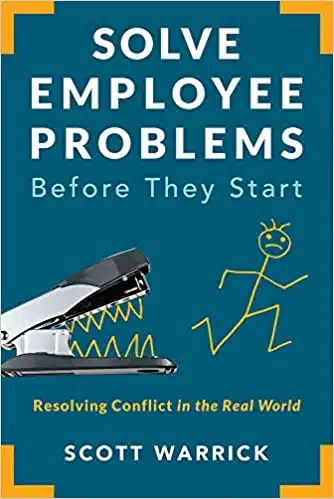
Solve Employee Problems Before They Start applies a three-pronged approach to mitigating and mediating workplace clashes: empathetic listening, parroting, and rewarding. Employment law attorney and conflict-resolution guru Scott Warrick advocates an emotionally intelligent management technique that aims to assure teammates you understand and care about their plight before reaching a workable solution. Acknowledging and honoring employee emotions increases the likelihood of a situation de-escalating rather than escalating, and improves the probability of satisfaction on all sides. Warrick pioneered a method he calls “Verbal Jeet” that treats conflict as a battle winnable by means of strategy and planning.
Notable Quote: “Solutions stem from our mutual interests and goals. That is where we find our common ground, and when we can see where the true common ground lies, solutions emerge.”
Buy Solve Employee Problems Before They Start.
Get our free team building toolbox
- icebreaker games
- bingo cards
- DIY guides
 by teams at FedEx, Amazon, Deloitte and 73,930+ others
by teams at FedEx, Amazon, Deloitte and 73,930+ others

3. Invent and Wander: The Collected Writings of Jeff Bezos by Jeff Bezos and Walter Isaacson

Invent and Wander collects the correspondence, speeches, and guiding philosophies of Jeff Bezos together into a primer on innovative, next-level, large-scale management. The book sorts Bezos’ musings into chapters with titles like:
- Thinking About Finance
- Making Decisions
- Growing New Businesses
- Setting Goals
- Building a Culture of High Standards
- Thinking Three Years Out
- Work-Life Harmony
- Competition
Part autobiography, part self-help book, Invent and Wander spans a wide array of situations entrepreneurs encounter through the lens of Bezos’ impressive empire and accomplishments. Although the book merely gathers pre-existing pieces of advice, performances, and memorandums, few readers could deny the fact that Jeff Bezos has experienced a wide management spectrum spanning multiple industries.
4. The Making of a Manager: What to Do When Everyone Looks to You by Julie Zhuo
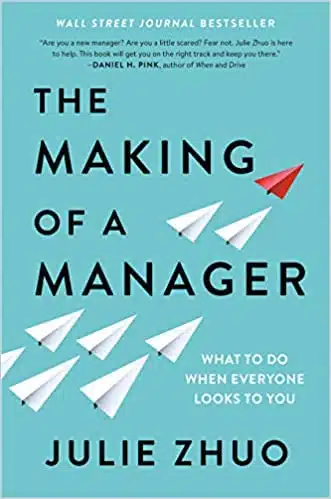
Early in her career, Julie Zhuo became a Facebook executive. As a new manager in her mid-twenties, Zhou found herself at times overwhelmed by the amount of skills to master, lessons to learn, and seemingly endless questions to answer. After a decade leading teams in Silicon Valley, Zhou penned her own guide to help freshly-minted managers feel more confident in new roles of responsibility. The Making of a Manager tackles topics such as qualities and behaviors that distinguish excellent managers from mediocre managers, navigating interviews, building rapport with teams, vanquishing doubt, and appearing composed and competent under pressure. Written from the perspective of a young leader, The Making of a Manager is one of the best management books for new managers.
Notable Quote: “That is the crux of management: It is the belief that a team of people can achieve more than a single person going it alone. It is the realization that you don’t have to do everything yourself, or even know how to do everything yourself. Your job, as a manager, is to get better outcomes from a group of people working together. It’s from this simple definition that everything else flows.”
5. How to Be a Great Boss by Gino Wickman and René Boer
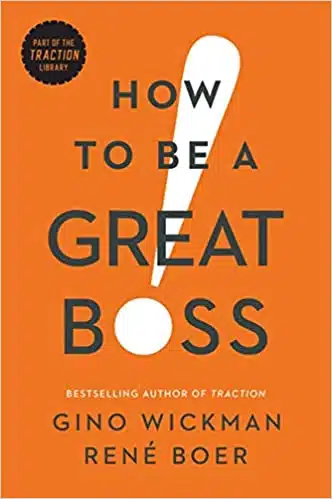
How To Be a Great Boss is a master course in employee engagement best practices, providing tools and suggestions for earning goodwill, trust, and respect from employees while still accomplishing goals and achieving results. The book breaks down basics such as:
- How to surround yourself with great people
- How to make more effective use of your time
- How to create accountability
- How to deal with direct reports that don’t meet your expectations
The book also outlines five essential management practices and leadership practices, respectively.
By following the advice laid forth by Wickman and Boer, managers can avoid staff disconnection and disengagement, delegate effectively, unlock the true potential of teams, and become a beloved boss for whom staff willingly travels the extra mile.
Notable Quote: “We’re facing a crisis that is not just measured by a lack of opportunity for the workforce, but also by the lack of enthusiasm that the workforce has for their jobs.”
6. It’s the Manager: Moving From Boss to Coach by Jim Clifton and Jim Harter
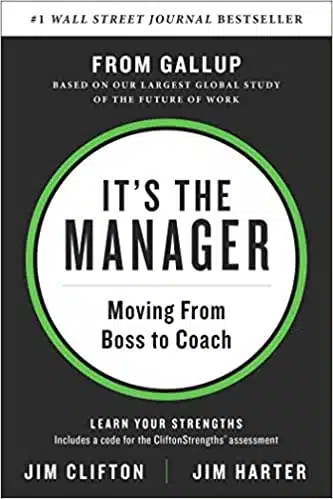
Jim Clifton is the CEO and Jim Harter is the chief scientist of Gallup, the organization that has gathered data on the State of the American workplace for over a decade. Using findings from Gallup polls, It’s the Manager pinpoints trends of effective management. The book asserts that team leaders and managers are the factor that most reliably determines an organization’s long-term success, and offers advice on performing managerial functions such as hiring, reviewing performance, enabling diversity, and managing other managers. Not only does the book analyze the current climate of management, but also looks forward to the near future, to better prepare managers for the industry environments of tomorrow.
Notable Quote: “Maximizing human potential not only has a positive impact on your company, but on your nation’s and the world’s productivity too. The stakes are that high.”
Buy It’s the Manager.
7. Project Management for The Unofficial Project Manager by Kory Kogon, Suzette Blakemore, James Wood
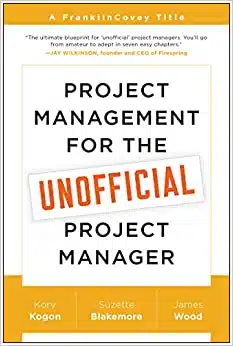
While most project management books target official project leads, Project Management for The Unofficial Project Manager speaks to professionals without formal titles or designations who shape or guide work undertakings. After all, a project’s success is not solely a manager’s responsibility, but rather lies on every contributor’s shoulders. The guide walks those willing to take ownership through all life stages of a project, from the inception and planning steps, to executing and managing workflow, and finally, completing the assignment and evaluating results. Project Management for the Unofficial Project Manager helps any team member structure, organize, and finalize any project with grace, knowledge, and competence.
Notable Quote: “Project management is as much about effectively leading people as it is about skillfully managing a process.”
Buy Project Management for The Unofficial Project Manager.
8. The Harvard Business Review Manager’s Handbook: The 17 Skills Leaders Need to Stand Out
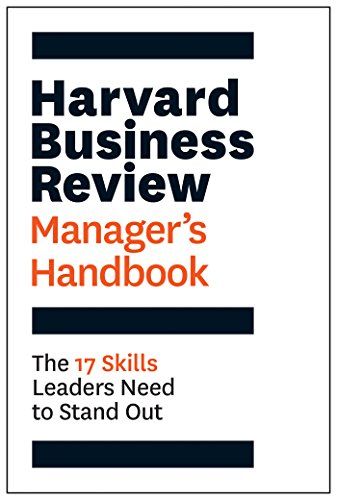
As the title suggests, this book serves as a manual for managers. While many other management books provide a single perspective, The Harvard Business Review Manager’s Handbook gathers insight from a range of experts to offer a comprehensive glimpse into the essentials of management. The book outlines 17 skills managers need to excel and shine, plus specific situations such as transitioning psychologically into the role, defusing strong employee emotions, interpreting of organizational strategy, drafting a delegation plan, and conducting effective meetings.
Notable Quote: “Managers have formal authority to make decisions, allocate resources, and direct employees — in theory. In actuality, though, people won’t do something just because you tell them to, and they certainly won’t do it well.”
Buy The Harvard Business Review Manager’s Handbook.
9. 101 Tough Conversations to Have with Employees: A Manager’s Guide to Addressing Performance, Conduct, and Discipline Challenge by Paul Falcone
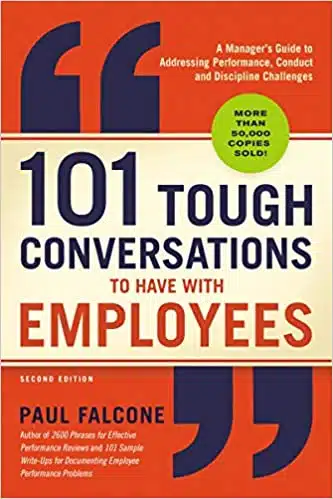
While many management books on communication focus on presentations or everyday conversation, 101 Tough Conversations to Have with Employees hones in on the difficult discussions managers occasionally need to initiative. The book veers into territory such as disciplinary proceedings or addressing poor performance, covering topics like:
- inappropriate appearance
- lack of technical knowledge or necessary skills
- bullying or gossip
- absence of teamwork or people skills
- laziness and underachievement
- defensiveness and excuse-making
- compensation conflicts
101 Tough Conversations to Have with Employees runs the gamut of challenging discourse, teaching managers how to conduct conversations with tact, empathy, and dignity to ensure the best case scenario for involved parties. Most managers dread starting such conversations, but this book offers a guide for how to handle any hurdle that may arise. From hirings to firings, pay problems to people problems, group conflict to individual issues, disruption of company policies to violation of laws, this book covers all ground.
Notable Quote: “After all, involved management is all about getting to the truly human concerns at hand, which are issues that may have been left unaddressed for far too long. And it’s only in that mode of positive confrontation that you’ll be able to simultaneously protect your company and allow your employees to take back control of their careers.”
Buy 101 Tough Conversations to Have with Employees.
10. The Manager’s Path: A Guide for Tech Leaders Navigating Growth and Change by Camille Fournier
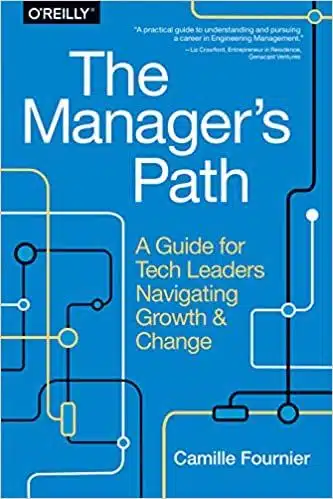
The Manager’s Path explores the unique challenges of managing within the tech industry. For example, the requirements of being both technologically savvy enough to delegate and evaluate work while also being competent enough in soft skills to lead employees effectively. The book explores managing in various capacities such as overseeing individuals, teams, multiple teams, and even other managers. Camille Fournier approaches management through the particular lens of startup and bootstrapping culture, teaching how to keep up with the demands of supervisory roles within the “move fast and break things” mentality of Silicon Valley.
Notable Quote: “Humans, by and large, feel good when they set small goals and meet them regularly.”
Buy The Manager’s Path.
11. The First-Time Manager by Jim McCormick
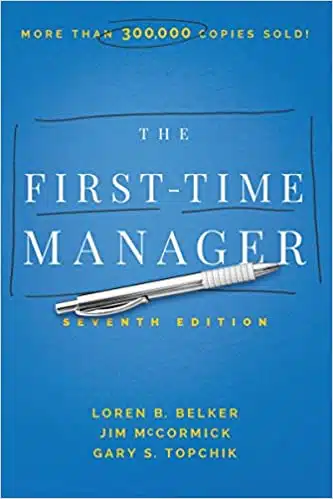
Another entry in the category of management books for new managers, The First-Time Manager emphasizes the differences between follower and managerial mindsets. The book delves into topics such as:
- building trust and confidence
- showing employee appreciation
- training team members
- dealing with resistance
- delivering performance appraisals
The First-Time Manager also covers territory like managing your own time, choosing a management style, leading with an appropriate sense of humor, and coping with stress. This book explores the less-mentioned avenues of self-regulation and self-reflection that are integral to supervisory roles.
Notable Quote: “When you create a setting where your people see that their efforts are contributing to a positive outcome well beyond what they could achieve individually, they will be more motivated and find greater meaning in what they do.”
Conclusion
Navigating the intricacies of management can seem daunting at times. Managers often want to look competent both to their bosses and their people, and may be hesitant to ask for help for seemingly obvious questions or difficult circumstances. Luckily, managers can turn to books for answers, accepting advice from accomplished professionals eager to impart wisdom to up-and-coming managers. While there is no shame in asking for assistance from colleagues, these books serve as valuable references to guide managers so that they can better guide their teams.
For more reading, check out our list of CEO books, these books on teamwork, these books on time management and this one with books on office management. We also have a great list of books on employee experience and books about business finances.
You may also want to learn about the signs of a good manager, signs of a bad manager, and this one on micromanagement at work.




